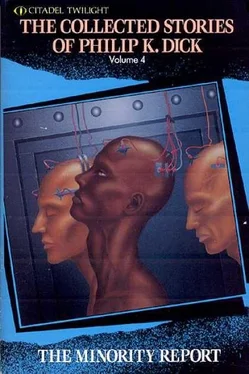Disgusted, Dorser clamped handgrapples around him. "Act like a man," he ordered. But there was no response; Babson was too far gone to hear him.
Satisfied, Taverner plunged off, past the knot of stunned officials and workers, into the inner offices of the project. Nodding curtly, Taverner made his way up to the desk where Leon Sipling sat surrounded by his work.
The first of the altered gestalts was already flickering through the scanner. Together, the two men stood watching it.
"Well?" Taverner said, when it was done. "You're the judge."
"I believe it'll do," Sipling answered nervously. "I hope we don't stir up too much… it's taken eleven years to build it up; we want to tear it down by degrees."
"Once the first crack is made, it should start swaying." Taverner moved toward the door. "Will you be all right on your own?"
Sipling glanced at Eckmund who lounged at the end of the office, eyes fixed on the uneasily working yance-men. "I suppose so. Where are you going?"
"I want to watch this as it's released. I want to be around when the public gets its first look at it." At the door, Taverner lingered. "It's going to be a big job for you, putting out the gestalt on your own. You may not get much help, for a while."
Sipling indicated his co-workers; they were already beginning to pick up their tempo where they had left off. "They'll stay on the job," he disagreed. "As long as they get full salaries."
Taverner walked thoughtfully across the hall to the elevator. A moment later he was on his way downstairs.
At a nearby street corner, a group of people had collected around a public vid-screen. Anticipating the late-afternoon TV cast of John Edward Yancy.
The gestalt began in the regular way. There was no doubt about it: when Sipling wanted to, he could put together a good slice. And in this case he had done practically the whole pie.
In rolled-up shirt sleeves and dirt-stained trousers, Yancy crouched in his garden, a trowel in one hand, straw hat pulled down over his eyes, grinning into the warm glare of the sun. It was so real that Taverner could hardly believe no such person existed. But he had watched Sipling's sub-crews laboriously and expertly constructing the thing from the ground up.
"Afternoon," Yancy rumbled genially. He wiped perspiration from his steaming, florid face and got stiffly to his feet. "Man," he admitted, "it's a hot day." He indicated a flat of primroses. "I was setting them out. Quite a job."
So far so good. The crowd watched impassively, taking their ideological nourishment without particular resistance. All over the moon, in every house, schoolroom, office, on each street corner, the same gestalt was showing. And it would be shown again.
"Yes," Yancy repeated, "it's really hot. Too hot for those primroses – they like shade." A fast pan-up showed he had carefully planted his primroses in the shadows at the base of his garage. "On the other hand," Yancy continued, in his smooth, good-natured, over-the-back-fence conversational voice, "my dahlias need lots of sun."
The camera leaped to show the dahlias blooming frantically in the blazing sunlight.
Throwing himself down in a striped lawnchair, Yancy removed his straw hat and wiped his brow with a pocket handkerchief. "So," he continued genially, "if anybody asked me which is better, shade or sun, I'd have to reply it depends on whether you're a primrose or a dahlia." He grinned his famous guileless boyish grin into the cameras. "I guess I must be a primrose – I've had all the sun I can stand for today."
The audience was taking it in without complaint. An inauspicious beginning, but it was going to have long-term consequences. And Yancy was starting to develop them right now.
His genial grin faded. That familiar look, that awaited serious frown showing that deep thoughts were coming, faded into place. Yancy was going to hold forth: wisdom was on the way. But it was nothing ever uttered by him before.
"You know," Yancy said slowly, seriously, "that makes a person do some thinking." Automatically, he reached for his glass of gin and tonic – a glass which up until now would have contained beer. And the magazine beside it wasn't Dog Stories Monthly; it was The Journal of Psychological Review. The alteration of peripheral props would sink in subliminally; right now, all conscious attention was riveted on Yancy's words.
"It occurs to me," Yancy orated, as if the wisdom were fresh and brand-new, arriving just now, "that some people might maintain that, say, sunlight is good and shade is bad. But that's down-right silly. Sunlight is good for roses and dahlias, but it would darn well finish off my fuchsias." The camera showed his ubiquitous prize fuchsias.
"Maybe you know people like that. They just don't understand that -" And as was his custom, Yancy drew on folklore to make his point. "That one man's meat," he stated profoundly, "is another man's poison. Like for instance, for breakfast I like a couple of eggs done sunny-side up, maybe a few stewed prunes, and a piece of toast. But Margaret, she prefers a bowl of cereal. And Ralf, he won't take either. He likes flapjacks. And the fellow down the street, the one with the big front lawn, he likes a kidney pie and a bottle of stout."
Taverner winced. Well, they would have to feel their way along. But still the audience stood absorbing it, word after word. The first feeble stirrings of a radical idea: that each person had a different set of values, a unique style of life. That each person might believe, enjoy, and approve of different things.
It would take time, as Sipling said. The massive library of tapes would have to be replaced; injunctions built up in each area would have to be broken down. A new type of thinking was being introduced, starting with a trite observation about primroses. When a nine-year-old-boy wanted to find out if a war was just or unjust, he would have to inquire into his own mind. There would be no ready answer from Yancy; a gestalt was already being prepared on that, showing that every war had been called just by some, unjust by others.
There was one gestalt Taverner wished he could see. But it wouldn't be around for a long time; it would have to wait. Yancy was going to change his taste in art, slowly but steadily. One of these days, the public would learn that Yancy no longer enjoyed pastoral calendar scenes.
That now he preferred the art of that fifteenth century Dutch master of macabre and diabolical horror, Hieronymus Bosch.
The first thought Anderton had when he saw the young man was: I'm getting bald. Bald and fat and old. But he didn't say it aloud. Instead, he pushed back his chair, got to his feet, and came resolutely around the side of his desk, his right hand rigidly extended. Smiling with forced amiability, he shook hands with the young man.
"Witwer?" he asked, managing to make this query sound gracious. "That's right," the young man said. "But the name's Ed to you, of course. That is, if you share my dislike for needless formality." The look on his blond, overly-confident face showed that he considered the matter settled. It would be Ed and John: Everything would be agreeably cooperative right from the start.
"Did you have much trouble finding the building?" Anderton asked guardedly, ignoring the too-friendly overture. Good God, he had to hold on to something. Fear touched him and he began to sweat. Witwer was moving around the office as if he already owned it – as if he were measuring it for size. Couldn't he wait a couple of days – a decent interval?
"No trouble," Witwer answered blithely, his hands in his pockets. Eagerly, he examined the voluminous files that lined the wall. "I'm not coming into your agency blind, you understand. I have quite a few ideas of my own about the way Precrime is run."
Читать дальше










